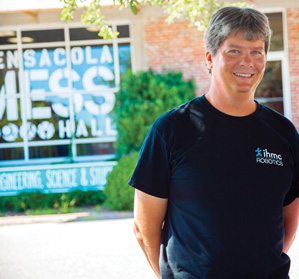Someday soon, robots will stride into an earthquake-shattered city or a contaminated nuclear plant and perform tasks too perilous for humans. Jerry Pratt, senior research scientist at the Florida Institute for Human and Machine Cognition (IHMC) in Pensacola, will keep them on their feet. Pratt writes walking algorithms for robots. In October, he will be inducted into the Florida Inventors Hall of Fame.

Pratt built his first invention as a teen in Ashland, Wisconsin: he entered his Knockout Keyless Door Lock in a competition sponsored by Duracell and earned a $10,000 scholarship. “You knocked on a door in a secret pattern to unlock it,” he remembers. “I thought it would be cool to have something like that on my tree fort.” At MIT he ran varsity track and cross-country and played intramural hockey, basketball, and football on the renowned teams Smell the Stick, Juicy Chicken, and the Flanking Itos.
As a graduate student, Pratt worked on bipedal robots in the Leg Laboratory. One of them, Spring Turkey, now resides at the MIT Museum. “It was one of the first walking robots that was good at being compliant on unfamiliar terrain,” he notes.
Pratt and three other MIT engineers cofounded Yobotics in 2000. The startup built an exoskeleton to carry heavy loads over rough ground, a robotic arm, and an intelligent patient lifter for hospitals. In 2002 he joined the not-for-profit IHMC, where he directs multiple projects. This summer his software team won second place and a million dollars in DARPA’s Robotics Challenge, in which a remote-controlled humanoid robot had to drive a car through an obstacle course, traverse a pile of cinder blocks, and then open valves and cut through sheetrock.
“The big application in robotics right now is disaster recovery, where there’s rubble everywhere,” Pratt says. “Humanoid robots have the potential to provide a presence in dangerous areas while keeping the human operators safe.”
In 2013, Pratt and his wife, Megan Benson Pratt ’93, founded the Pensacola MESS Hall, a hands-on science museum. MESS, which stands for “math, engineering, science, and stuff,” is an allusion to Pensacola’s Navy culture. The facility serves up MESS Kits—experiments in a box—to about 20,000 visitors a year. Megan Pratt, who has a Harvard PhD in neuroscience and served for six years on the Pensacola City Council, is its executive director. The Pratts enjoy water sports, games, and camping with their school-aged daughter and son, who both like programming in the Media Lab’s Scratch language.
Keep Reading
Most Popular
Large language models can do jaw-dropping things. But nobody knows exactly why.
And that's a problem. Figuring it out is one of the biggest scientific puzzles of our time and a crucial step towards controlling more powerful future models.
The problem with plug-in hybrids? Their drivers.
Plug-in hybrids are often sold as a transition to EVs, but new data from Europe shows we’re still underestimating the emissions they produce.
Google DeepMind’s new generative model makes Super Mario–like games from scratch
Genie learns how to control games by watching hours and hours of video. It could help train next-gen robots too.
How scientists traced a mysterious covid case back to six toilets
When wastewater surveillance turns into a hunt for a single infected individual, the ethics get tricky.
Stay connected
Get the latest updates from
MIT Technology Review
Discover special offers, top stories, upcoming events, and more.